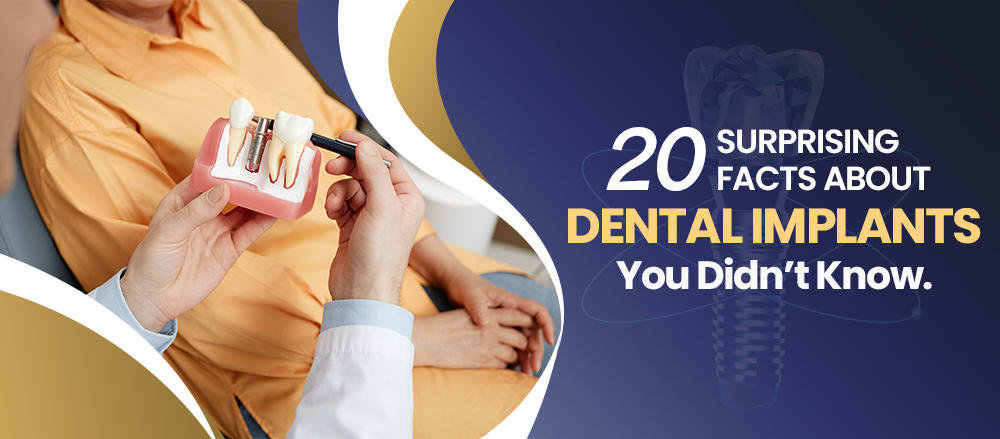Located at 20 Old Brompton Road – Just Steps from ![]() South Kensington Tube. Easy Access, Always.
South Kensington Tube. Easy Access, Always.
Located at 20 Old Brompton Road – Just Steps from ![]() South Kensington Tube. Easy Access, Always.
South Kensington Tube. Easy Access, Always.



Dental implants have revolutionised modern dentistry, offering a reliable solution for missing teeth and significantly improving countless smiles. While many are aware of the basics, there’s much more to uncover about these remarkable dental advancements. In this guide, we look into 20 interesting and lesser-known facts about dental implants, focusing on their history, benefits, and surprising details that make them a distinct option in restorative dentistry.
Taste might not be the first thing you associate with dental implants, but it is a popular question many people ask. The first thing to note is dental implants have no taste. They are made from biocompatible materials like titanium, and are completely tasteless and non-reactive. So, if you ever wonder what dental implants taste like, you must remember they taste like nothing at all!
Zygomatic implants are ideal for cases with insufficient upper jaw bone. But you cannot usually feel them in your cheeks. These implants are carefully positioned by skilled oral surgeons to avoid protruding into the cheeks. When placed correctly, they remain unnoticeable, ensuring they do not affect your facial appearance or comfort. Zygomatic implants provide a seamless, effective solution for restoring smiles without compromising aesthetics or sensation.
If you have dental implants, you might wonder whether they could set off metal detectors at airports or security checkpoints. Fortunately, dental implants are usually crafted from titanium, a non-magnetic material, meaning they would not trigger detectors or alarms, causing delays. This ensures you can pass through security smoothly without any issues. So, you can travel with confidence, knowing your implants would not interfere with the screening process at airports or other secure locations.
Maintaining proper oral hygiene is essential for the long term success of dental implants, and flossing plays a key role. However, flossing around implants may differ slightly from natural teeth. Using specialised tools like implant-friendly floss or soft toothpicks can make cleaning more effective and easier. Regular flossing helps prevent gum disease and protects the health of your implants. Consult your dentist for personalised advice on the best techniques and tools to ensure your implants remain in excellent condition.
Tinnitus, characterised by a ringing or buzzing sound in the ears, can be a troublesome condition. Many may wonder if dental implants can trigger or worsen tinnitus, but there is no known link between the two. If you develop tinnitus after getting dental implants, it is important to consult a healthcare professional to determine the underlying cause. A thorough evaluation will help identify any other factors contributing to the condition, ensuring appropriate treatment and management.
Your sense of taste and smell relies mainly on receptors in your nose and tongue, not your teeth. As a result, dental implants do not affect your ability to taste or smell. These sensory functions are independent of the presence of implants in your mouth. Dental implants are designed to replace missing teeth without interfering with these essential senses, allowing you to enjoy the full range of flavours and scents just as you did before the implants.
Dental implants placed in the upper jaw, particularly zygomatic implants, are positioned near the sinus cavities, which may raise concerns about potential sinus complications. However, when performed by a skilled professional, implant surgery should not increase the risk of sinusitis or sinus infections. Careful planning and precision are essential to ensure the implants do not interfere with the sinus cavities. With proper technique, the risk of complications is minimal, allowing for successful, safe implant placement without affecting your sinus health.
Zygomatic implants are used in the upper jaw to support dental prosthetics when traditional implants are not possible due to significant bone loss. Since they are positioned near the eye sockets, some may wonder if they could affect vision. However, zygomatic implants are strategically placed below the cheekbones, ensuring they do not interfere with your vision. These implants offer a reliable solution for individuals who lack sufficient bone structure, restoring both function and aesthetics without any impact on eyesight.
A common concern when considering dental implants is whether they will change the shape of the face. Dental implants are designed to replace missing teeth and restore oral function, and they help maintain the natural structure of your jawbone. However, they typically do not alter your facial appearance. Any noticeable changes in facial shape are usually due to the restoration attached to the implants, rather than the implants themselves. With proper placement, dental implants can enhance your smile without causing significant changes to your overall facial structure.
Osteoporosis, a condition that weakens bone density, can impact the success of dental implants. However, it does not automatically rule out the possibility of receiving implants. If you have osteoporosis, it is important to consult with a dental specialist who can evaluate your individual case and determine the best approach. In some situations, additional measures, such as bone grafting, may be recommended to improve the chances of success and ensure the procedure’s effectiveness. A personalised assessment will help determine the right treatment plan for you.
Scuba diving is an exciting activity enjoyed by many, but if you have dental implants, you may wonder if it is safe. Generally, dental implants are not affected by underwater pressure, so most people with implants can dive safely. However, it is important to consult your dentist before diving to ensure it is suitable for your case. Your dentist can offer personalised advice and recommendations, helping you enjoy your underwater adventures without concerns about your dental implants. Always prioritise professional guidance to ensure a safe and enjoyable experience.
Professional athletes, particularly those in contact sports like football or hockey, may need dental implants due to injuries. Although dental implants are a viable option, it is crucial for athletes to take extra precautions to protect them during physical activities. Custom made mouth guards are highly recommended to reduce the risk of damage to implants. These guards provide added protection, allowing athletes to continue competing with confidence while safeguarding their dental health and implant investment.
For many, travelling to outer space is a dream, but some might be worried if dental implants prevent them from fulfilling this dream. Thankfully, dental implants do not pose a barrier to space travel. Astronauts undergo thorough dental examinations and treatments to ensure their oral health is in top condition before missions. Dental implants are deemed safe for space travel and are treated the same as other dental restorations, ensuring astronauts can focus on their mission without concerns about their dental health.
If you have dental implants, you may wonder about their sensitivity to temperature changes, particularly with hot or cold foods and drinks. Dental implants themselves do not contain nerves, so they are not affected by temperature fluctuations. However, the surrounding gum tissue may experience some sensitivity, particularly after implant surgery. This sensitivity typically decreases over time, and as healing progresses, you should be able to enjoy hot and cold foods and beverages without discomfort. It is a gradual process, and most people find their sensitivity resolves within a few months.
Imagine the rush of riding a roller coaster, your heart racing and adrenaline soaring. But do you feel your dental implants during such thrilling moments? Once dental implants have fully integrated with your jawbone, they become a seamless part of your mouth and you are very unlikely to feel them. You would not feel them or be aware of their presence, even during high-energy activities like roller coasters. Dental implants are designed to function just like your natural teeth, offering comfort and stability in everyday life, no matter how exciting the experience is.
Dental implants do not include fake gums; rather, the prosthetic teeth or dental crowns are secured to the implants. To enhance the natural look, these restorations may feature artificial gum material, which helps create a more aesthetically pleasing appearance. However, this gum like material is not a part of the implant itself but is an added component of the restoration, designed to blend seamlessly with the surrounding tissue and provide an authentic result for a complete, natural looking smile.
Dental implants serve as an alternative to natural teeth and unlike natural teeth, they do not have roots. This means they do not require root canals. However, if you still have remaining natural teeth or dental crowns, they may still need root canals if they develop problems like infection or decay. While dental implants themselves are immune to root canal problems, it is important to maintain regular dental care for any natural teeth or crowns to avoid potential complications.
If you are a singer or musician, you might worry about how dental implants could affect your voice. However, dental implants typically don’t have a significant impact on your singing voice. Any changes in vocal performance are usually linked to adjustments in dental prosthetics or other factors. Many professional singers have successfully maintained their vocal abilities after receiving dental implants, proving that implants can coexist with musical careers without compromising vocal performance. You can now be stress free about your ability to sing or play music as it should not be hindered by dental implant treatment.
There is no strict age limit for dental implants. While age can influence the process, the most important factors for candidacy are overall health and the condition of the jawbone. Many older adults have successfully received dental implants, as long as their bone structure is healthy enough to support the implant. Age should not be a barrier to achieving a beautiful, functional smile. With proper evaluation and care, dental implants can be an excellent option for individuals of any age.
It is important to highlight that dental implants can greatly enhance your overall quality of life. They offer a stable, longlasting solution for missing teeth, allowing you to eat, speak, and smile with confidence. Beyond the physical benefits, dental implants can also improve your self-esteem, boost oral health, and contribute to a happier and more fulfilling life. With this restorative option, you can enjoy a renewed sense of well-being and a more vibrant lifestyle.
Dental implants offer far more than just a dental procedure. They provide a transformative solution with numerous benefits. Thefacts discussed above highlight the versatility, safety, and effectiveness of dental implants in restoring not only your smile but also your self-confidence. Whether you are considering dental implants or already have them, it is essential to consult with a qualified dentist or oral surgeon to discuss any questions or concerns. With the expertise and guidance of a professional, your journey to a healthier, more beautiful smile becomes easier. Embrace the outstanding advantages of dental implants and unlock the potential for a brighter and more confident future.